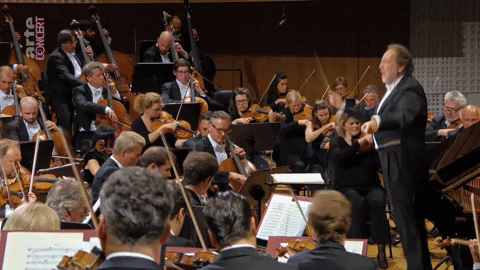As far as leadership metaphors go, there are worse ways to go than to suggest that management is a bit like conducting a symphony orchestra.
Both situations involve one person who is out in front, like the public face of the entire organization. When the show is over, the conductor takes a bow—or gets the eggs thrown at them. Similarly, the leader of virtually any collection of humans often takes disproportionate credit or blame for a situation that arises under their watch.
The conductor1 of the orchestra might seem unimportant at first glance. After all, it’s not like they actually play any instruments during the performance! Instead, they just kind of lord over all the actual talent, cracking the whip and making everyone play at their level best all the time.
Of course, I’m being very facetious here. The conductor plays a crucial role in timing, for one thing. If you have a violin jumping in too early, that mistake might fall on the shoulders of the violin player, but an equal or greater amount of blame is usually directed toward the conductor. That’s because they’re responsible for the entire operation.
To deepen the metaphor just a bit, the conductor has to pay close attention to the symphony. This is the actual product that matters, so all the mistakes in practice need to be out of the way for this performance. Likewise, if you’re running a business, the only side that really matters at the end of the day is whatever you’re selling2.
A conductor and their orchestra are, collectively, a paradox. The conductor knows what the entire score should sound like, note by note. They can see the big picture well. But the conductor doesn’t know how to play any of the notes (if you’re a conductor who knows how to play notes, sound off in the comments, please).
The violin player, by contrast, knows their role incredibly thoroughly (except that one guy who always jumps in too early). They can see the trees, so to speak, but they have no idea what the forest looks like.
This paradoxical trade-off is exactly why leadership can work. That’s because it’s not possible to do everything at once—not well, anyway, and a symphony certainly demands execution at the highest level, which means you need to really focus on your role, and on your role alone.
Imagine a conductor ripping the violin from that poor dude’s hands just because he was early that one time and screwed the whole symphony up. This is micromanagement in business, and it can be every bit as destructive as the conductor abandoning their timekeeping role in the middle of a symphony, because only they can fix this.
A good conductor—of a symphony or of a business—needs to make sure a few things happen, above everything else. While their hands are waving (or while they are directing a meeting, let’s say), the conductor needs to listen carefully at all times.
In an orchestra, this means hearing micro-derivations before anyone else can, and adjusting the tempo ever-so-slightly, so nobody notices but them. In a business, this means reading between the lines and truly hearing what your staff are saying about what’s going on. Even if you’re leading from the trenches, you can’t see everything that’s happening.
Similarly, a conductor isn’t trying to make one of those subtle corrections by drawing even more attention to the tiniest mistake. Instead, their hand gestures need to be just as subtle as the underlying adjustment, just as a gentle correction in management is almost always (but not always always) a much better approach.
The star of the show is the orchestra, and it pays to keep that in mind if you’re a conductor. Likewise, if you’re in the orchestra, you have to put a degree of trust in the conductor’s vision and allow them to conduct.
If you’re looking for other types of conductors, this is an excellent option for your next read
The people helping you run your business matter every bit as much, but this felt like a digression






I actually think the "conductor" analogy is quite appropriate in the AI era.
We humans will increasingly take on the role of conductors as we "conduct" a team of specialized expert AI tools and models.
Until, of course, we're sent off to the bio farm facility for our molecules or whatever. I dunno, I've been meaning to watch that brand new "Matrix" movie everyone's talking about. I believe Tom Cruise is in it or something?
On a silly side note, I asked ChatGPT to imagine a silly duck character called the "Con Duck Tor," and got this: https://i.imgur.com/00Km2Ai.png
I was hoping for more of a "con man" vibe, but eh, it is what it is.
What the ah is going on with that conductor